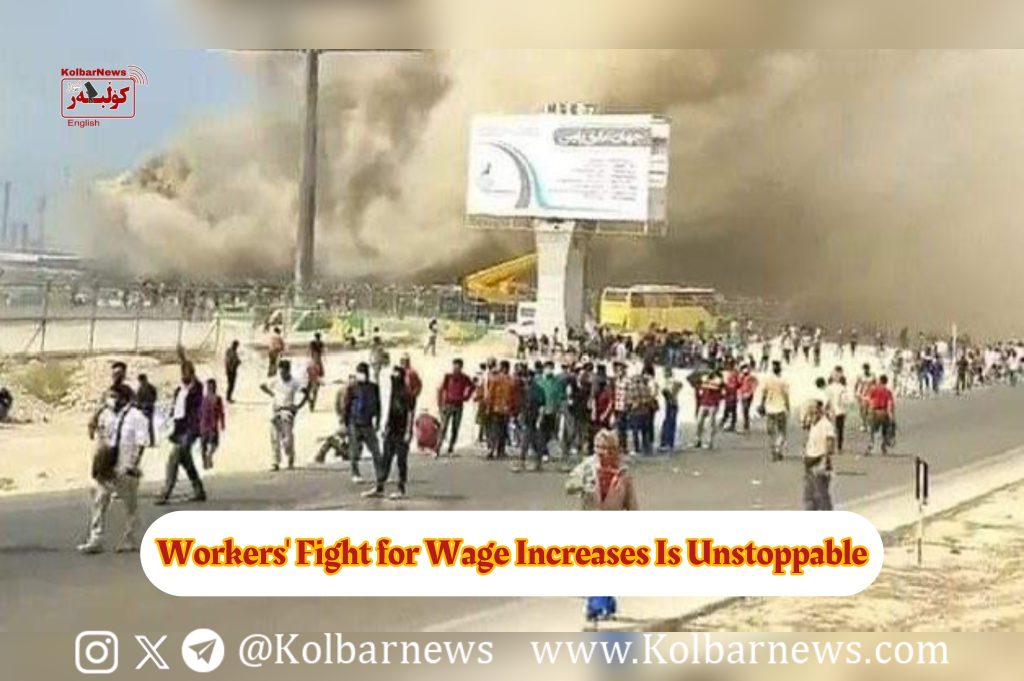
Just three days after the electoral show and the appointment of Masoud Pezeshkian, workers’ protests in various cities continue as before. For instance, workers from the Rudbar Water and Wastewater Contracting Company have been on strike for the thirteenth consecutive day, protesting against eight months of unpaid wages and job insecurity. More than 30,000 project workers from 123 companies in the oil and gas industries in Bushehr, Khuzestan, and Isfahan have been protesting since the end of June, demanding wage increases, the abolition of widespread wage and welfare discrimination, and the removal of contractors from labor jobs. The striking workers, under the “14–14 Campaign,” are demanding wage increases, 14 days of work followed by 14 days of rest, and the elimination of contractors. In this hot summer period, they also seek proper working conditions in industrial centers and welfare facilities in their living environments. Contractors have tried to break the strikes by hiring new workers, but unemployed workers have refused to replace their colleagues, thwarting the employers’ plans. Meanwhile, threatening text messages were sent to the striking workers, but the oil workers ignored them. Retired workers in cities like Shush, Ahvaz, Kermanshah, Tehran, Isfahan, Dameghan, Qaemshahr, and Kerman have taken to the streets to protest inadequate pensions, and dismissed workers from the Ilam Petrochemical Company have held protest rallies demanding reinstatement.
Although the common theme of all these gatherings is opposition to the decisions and policies of Raisi’s government, workers, with their experience of various government administrations, do not trust promises from figures like Pezeshkian and know that what they do not achieve through direct struggle is unattainable. In reality, there is no obstacle preventing the employers of various private companies, state companies, and economic centers controlled by the Islamic Revolutionary Guard Corps (IRGC) from meeting the workers’ demands for wage increases today. Why should workers have to wait another two months for this critical issue?
The Etemad newspaper wrote in its July 9 issue: “The main reason for workers’ protests in the past two years is that due to the increasing gap between wage growth and rising inflation, they have had to cut many expenses, especially medical services (except in life-threatening cases), welfare services (travel, leisure, clothing, entertainment, purchase of cultural and recreational goods), and even education (except for mandatory public education or higher education in free public universities) from their household budgets. They have had to settle for a filling but low-quality diet by eliminating expensive but nutritious foods like red meat and fruit. In the past three years, the inability to pay rent, due to rent increases outpacing wage growth and the government’s unfulfilled promises to solve the housing problem, has forced many worker families to move to cheaper, lower-tier areas or even the problematic outskirts of cities to manage rents that consume 50-70% of their household income.”
During his election campaign, Pezeshkian stated on television that wages must grow in line with inflation; it is unacceptable for inflation to be 50% while wages increase by only 20%. We must adopt measures to ensure that wages match inflation.
Workers are demanding wage increases based on the promises made during the election campaign by the new president. The expansion of these strikes since Pezeshkian took office indicates that wage issues are a matter of life and death for workers and cannot be postponed.
Worker activists say this widespread strike has put significant pressure on contractors, and with the workers stopping work, other sections of the oil industry not involved in the protests have also been disrupted, incurring costs for the contractors. These activists also emphasize the unprecedented unity between contractual and third-party contract workers. They are trying to turn the solidarity of official and bulk workers into active participation in the strike with the slogan “Unity is our key to victory.” According to reports from the Council for Organizing Protests of Oil Contract Workers, the pressure from the oil workers’ expanding strikes has forced managers in some companies to retreat, making promises to create divisions among the strikers.
However, the strikers have faced the contractors with slogans like “Workers’ table is one” and “The strike is nationwide.” Workers, having experienced previous breaches of promise by employers, are united in continuing their struggle to involve as many oil, gas, and petrochemical workers as possible and to push back all contractors.

